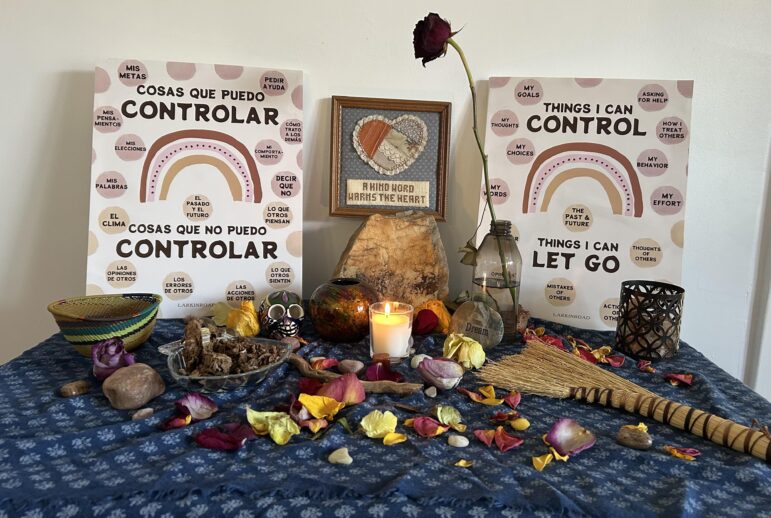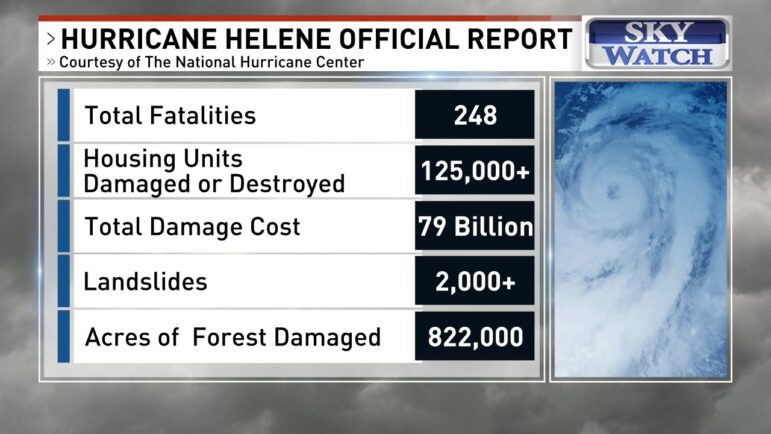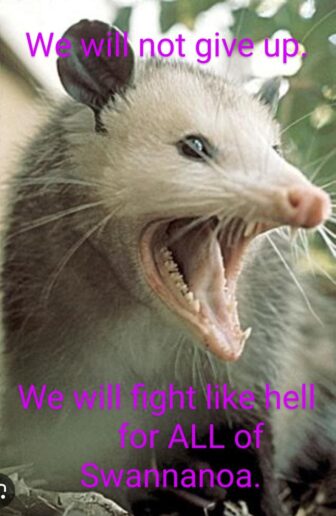
Editor’s note: This is the sixth and final part of a series about the aftermath of Hurricane Helene in her home community, the Swannanoa River Valley of Western North Carolina. You can read the rest of the series here.
Last week marked the Spring Equinox, when the Wheel and the calendar indicated that spring had arrived. However, the path between seasons is not marked with sharp edges. After experiencing the challenges of the five months following Helene, I eagerly moved through the kaleidoscopic seasons, observing the early signs of change. I danced in the garden when I found purple dead nettle blooming, and I crowed with delight when the daffodils returned from the underworld.
There are no sharp edges along the path of recovery from a natural disaster, either. The cleanup process continues at a slow pace. In this community, dedicated groups of volunteers have worked many Saturdays to clear away debris. A few weeks ago, a small but essential bridge finally reopened, restoring a neighborhood connection between US Highway 70 and Old US 70. Crews have been tearing down and cleaning up the remains of business buildings Helene destroyed along the main road through the valley. The visual difference is uplifting in some ways, but in others, it increases the deep, hollowing sense of loss.

Community energy and prayer altar, Swannanoa Communities Together. Photo by Sheri Barker.
Spring is blooming all over the place, showcasing the resilience of nature. Dogwoods, redbuds, and other trees are putting on bright displays, and creeping phlox and other early spring plants are feeding the pollinators that are already out and about. These beautiful reminders of hope are happening adjacent to mudslide scars and acres of downed trees, destroyed homes, mountains of debris, and the remains of my neighbors’ belongings. Occasionally, I drive along the Swannanoa River or neighboring creeks because I cannot keep ignoring them, but seeing the places where the old riverbed and waterways are empty and new routes have been created scours my spirit with the sand and rock that is left behind. We are all in various phases of trauma and healing: the land, the water, and their people.
This starkly raw visual dichotomy parallels the journey of countless people trying to survive the aftermath of Helene without sufficient support from local, state, and federal governments. From my vantage point behind one desk in a small yet large-hearted community organization, I meet dozens of people each week who need help with shelter, food, utilities, medicine, mental health care, vehicle repairs, and any trauma or stress that one can imagine.
Yes, six months later, there are still people who are unhoused or living in tents, sheds, campers, or the remains of damaged housing in substandard conditions, lacking basic amenities such as water, toilets, heat, and electricity. Yes, some of those people might have been unhoused before the storm. People in the storm recovery community have asked that question in discussion groups in which I have participated. Why does it matter? Seriously, people. Why does it matter? Every person deserves a safe, affordable, and comfortable living environment. It does not take a natural disaster to qualify for the right to housing.
Many people share stories of how, in the beginning, we worked side by side to help each other without any thought of differences in race, gender identity, or politics. Everyone helped everyone else without question. Those cozy thoughts created a happier, fairy-tale version of events that eased the minds of people who lacked the lived experiences to understand the disparity and inequity that are always present in this community. This country. This world.

Report of fatalities and damage following Hurricane Helene [WLOS 13]
There were danger signs from the beginning. Armed vigilantes from out of state patrolled my neighborhood. Aid stations refused to help some people because of the color of their skin. A church required anyone requesting food, water, or medical care to sign a form stating that they supported the church’s far-right beliefs. Local politicians and first responders told unnecessary and sometimes harmful lies.
Even though I recognized and called out those behaviors, I still did not comprehend the totality of what was happening until I stepped out of my comfort zone and into new spaces. I have learned that being socially aware of issues is one thing, while meeting them face-to-face with an open mind and an empath’s heart is entirely another.
Western North Carolina was experiencing a housing crisis long before Helene wiped out 125,000 homes. Unhoused neighbors were treated like living with unmet needs is a criminal matter. Impoverished neighbors were often treated the same. Biases built into local systems by city council members, county commissioners, the all mighty tourism board, and the state legislature created housing barriers for those neighbors as well as immigrants, people of color, members of the LGBTQIA+ community, and some members of the everyday working class.
Housing remains a critical issue post-Hurricane Helene, and it is exacerbated by the things I mentioned in the previous paragraph, as well as the greed of some property owners and the unfathomable ignorance or intentional blindness of community leaders and politicians.
The City of Asheville recently announced that none of the $225 million in federal relief funds it received would be allocated toward rental assistance. The Asheville Blade reported that the City’s first major rebuilding contract is for the City-owned golf course. The city considers this to be “a key infrastructure recovery milestone.”

A possum hissing, with the caption “We will not give up, we will fight like hell for ALL of Swannanoa.” Credit: Mary Etheridge Trigg, Director, Swannanoa Communities Together
In response to this elitist folly and the publication of the National Hurricane Center’s official report on Helene, Swannanoa activist and community champion Beth Trigg wrote the following in a social media post:
What does it mean 6 months later that 125,000 homes were destroyed?
There is no recovery without understanding that thousands of people still have no place to live.
Any conversation about recovery that doesn’t acknowledge this massive crisis and the traumatized, unhoused people at the center of it is a travesty.
Any discussion of policy, funding, or planning that doesn’t place permanent affordable housing, rental assistance, and emergency housing at the absolute center of the table is a table that deserves to be flipped over.
We are now at the point where a huge group of desperate people is becoming long-term unhoused with all of the trauma and costs that go with that.
I don’t want to hear about anything but housing and food from anyone talking about recovery until these basic human needs are addressed.
You can take your glittering plans for lovely new business districts and tourist attractions and bury them in the debris piles filling our neighborhoods with the broken pieces of people’s homes and lives.
Housing first. Housing now.
The world around those of us working to help our neighbors continues to change kaleidoscopically, colors and light spinning through love, compassion, and grief. The webs of connection we are building between our communities and others continue to grow in size and strength. We laugh and cry; we are tender and fierce; we celebrate both the small and large wins and push ourselves and each other to find resources to help our neighbors, even when it seems like we cannot make it happen.
Helene was just the beginning of the troubles. I believe we all know that. But as Mary Etheridge Trigg, Director of Swannanoa Communities Together said, “We will not give up. We will fight like hell for ALL of Swannanoa.”
So mote it be.
The Wild Hunt is not responsible for links to external content.
To join a conversation on this post:
Visit our The Wild Hunt subreddit! Point your favorite browser to https://www.reddit.com/r/The_Wild_Hunt_News/, then click “JOIN”. Make sure to click the bell, too, to be notified of new articles posted to our subreddit.